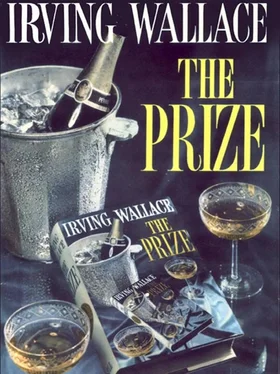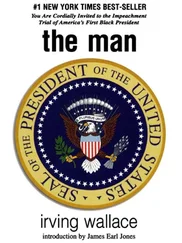Now, observing Eckart clean the fog from his monocle with a handkerchief, Krantz felt the snug security of having such an omnipotent patron.
‘Here we are,’ said Krantz.
He hastened to open the front door for Eckart, and when his visitor was inside and comfortable, Krantz unlocked the boot of the Mercedes, lifted the bag inside, closed it, and then got behind the wheel.
They had driven a minute or two, but it was not until they had left the Bromma Air Terminal out of sight that Professor Hans Eckart spoke at last.
He was a man with no small talk, and he had no small talk now.
‘You are waiting for me to congratulate you, Carl-’
‘Well-’ said Krantz, unsure if he should be perplexed or modest.
‘-and I do congratulate you, on my own behalf, and on behalf of my colleagues.’
‘Thank you, Hans,’ said Krantz earnestly, with deep relief.
‘To be frank, we had expected this to be Max Stratman’s year all along. But we could take no chance. You Nobel people are too easily misled or diverted. It was because we could take no chance that we had you in Berlin, Carl.’
Deferential as he was, Krantz could not let this go by so easily. His own services had to be put in true perspective. ‘It is never anyone’s year for the Nobel award,’ he said mildly. ‘As a matter of fact, before last February, there was even some doubt that he would be nominated. His old accomplishments were dated and had long been superseded. And as to this new discovery, there was some question about his work in solar energy, not only in the Royal Swedish Academy, but in those eminent faculties throughout the world who nominate. There was a widespread feeling that it had not yet been proved, that it was too early. What reinforced that resistance was the cloak of secrecy the Americans threw about his find. Because of lack of information, there were many judges who said, “Perhaps it is overrated. Perhaps it is a hoax.” ’
‘It is no hoax, I promise you.’
Krantz looked at his German friend thoughtfully. ‘You are sure of that?’
‘We are sure,’ said Eckart.
‘That was my feeling, all along, of course,’ said Krantz. ‘In any event, no nomination of Stratman had come through by early January, and the whole possibility became more precarious. It meant that if no one had nominated him, I would have had to do so at the last minute. Had that happened, I freely admit I do not think I could have put him over. Fortunately, at the eleventh hour, three strong nominations came in, one each from America, England, France -’
‘Naturally,’ said Eckart with a tinge of acidity. ‘They all share his find. They know .’
‘And so, then, to add weight, I submitted my own nomination of Stratman, too. That made four. That made him a more promising candidate, but by no means a favourite, by no means. At least three other candidates had an inside track, with cliques behind them. I never faced a more arduous task.’
Dr. Hans Eckart was as much a diplomat as a scientist, and he knew when to crowd and when to coddle. This was a moment for graciousness. ‘Do not misunderstand me, Carl. I was merely feeling you out, to learn what your position was when the contest began. Your letters were guarded, but I suspected your difficulties. We are all overjoyed by your incredible achievement. My congratulation was not an empty formality. It was given in sincerity.’
‘I hoped you would understand, Hans.’
‘We do. We appreciate your abilities. More than that, your comradeship, also. Would we have given you this assignment-where there could be no failure-unless we wholeheartedly believed in you?’
‘I thank you for your trust, Hans.’
‘Now my inquisitiveness has got the better of me,’ he said. He stared out of the moving car window, at the frost-nipped, barren Swedish countryside, and then he returned to his host. ‘I know a little about your precious prizes, of course, but I am curious about how you put Stratman over. You said there was resistance from the start. How could one man possibly overcome it? In short, how does one man win, singlehandedly, a Nobel award for another?’
Krantz was pleased. With one hand free of the wheel, he tugged at his goatee. Now he understood. At the outset, Eckart had minimized his part in the physics award, because he did not wish Krantz to get out of control or demand too much. It was their clever technique. Krantz knew them well. He was one of them. But underneath it all, they knew that he, Carl Adolf Krantz, a voting member of the Royal Swedish Academy of Science, had indeed swung the award to Stratman, the man they wanted to have the award this year. And now the jockeying was done, and Krantz’s achievement had been recognized, and he could speak with self-complacent honesty.
‘I will not make more of myself than I am,’ he told Eckart disarmingly. ‘Three or four times, in past years, in different categories, a single member, one judge, has been able to take a minority candidate and convert him into the first choice. It takes careful handling, believe me. Usually, especially in physics, there is a heavily favoured candidate, and he sweeps all before him, and nothing can be done about it. Such was the case when Wilhelm Roentgen won the first award for his discovery of the X-ray. It was the same when Enrico Fermi won, and again when Ernest Lawrence received the prize for the cyclotron. On the other hand, there was Albert Einstein, and he proved vulnerable. Outside influences kept us from honouring his general theory of relativity. You remember Philipp Lenard, your fine Nobel winner? It was said that Lenard became an anti-Semite after Germany lost World War I. Possibly because Einstein was a Jew, Lenard was opposed to him. Lenard made a great campaign against Einstein, telling our judges that the theory of relativity was not actually a discovery, had not been proved, and was valueless. This gave our judges pause. They avoided Einstein for seven years, and when they elected him physics laureate in 1921, it was for the lesser law of the photo-electric effect and not for relativity. I relate this only as evidence that our judges can be moved in one direction or another. Not usually, but on rare occasions. To have one man influence the judges, for or against a candidate, especially a minor candidate, this one man must know where the competition is vulnerable and have unlimited enthusiasm for the candidate he is promoting. Had you suggested any physicist other than Stratman, I might not have been able to summon up the necessary enthusiasm. But we talked about this at Humboldt-Stratman is a candidate I believed in from the start. His harnessing of solar energy will, I am convinced, change the face of the world-’
‘Yes, yes, we agree,’ interrupted Eckart.
‘-and so you gave me a name worthy of my devotion. Very well. That is first. You had asked me how one man, by himself, could win a Nobel Prize for another. And I have said that it has happened on several occasions. I will cite one, for your edification. It occurred during 1945, in the Swedish Academy, when they were preparing for the year’s literature award.’
‘Literature,’ said Eckart, removing his monocle. ‘Hogwash.’
‘You will have to take that up with Alfred Nobel,’ said Krantz flippantly, and then regretted his levity and retreated. ‘I am inclined to agree with you, of course. But there is an award, and eighteen judges, and how does one put over a minority candidate? Well-1945. The favourite candidates, that year, were a number who later won, André Gide, William Faulkner, Hermann Hesse, and others like Jules Romains, Carl Sandburg, Benedetto Croce. There was even talk of giving Thomas Mann a second award. During all of this discussion and byplay, one of the judges in the Academy, Hjalmar Gullberg, a poet, fell in love with the verse of an obscure teacher from Chile named Gabriela Mistral. Have you ever heard of her?’
Читать дальше












